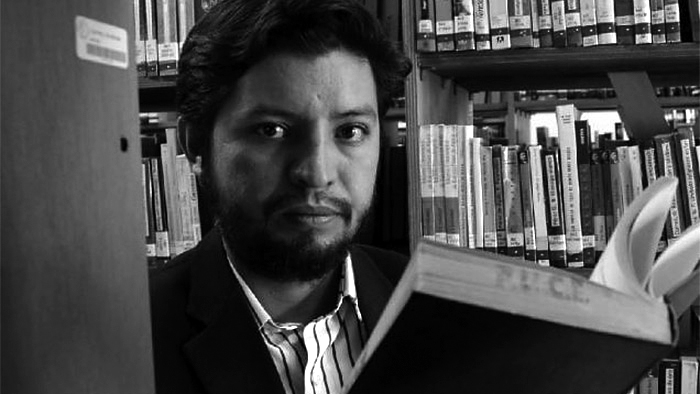
Image courtesy of UT Dallas
Santiago Vizcaíno (1982 —) was born in Quito, Ecuador. He studied degrees in Literature at the Catholic Pontifical University of Ecuador (PUCE) and the University of Málaga, and currently serves as the Director of the PUCE Center for Publications. He has published three books of poetry, one short story collection, and a book-length study on Argentine poet Alejandra Pizarnik. His work has received several accolades, among them the Ecuadorian Ministry of Culture’s National Literary Projects Prize and the Second Annual Pichincha Poetry Award. His poems and short stories have appeared in translation in a number of journals, including The Bitter Oleander Review, Chattahoochee Review, Connotation Press, Eleven/Eleven, eXchanges, Lunch Ticket, The Brooklyn Rail and Ezra. The poems translated here are taken from his most recent collection of poems, Hábitat del camaléon (Ruido Blanco, 2015).
Porn Verse
It was a line suggestive of genitalia,
or was it genitalia that dictated the music
of the slow movement of the hidden?
The words tripped each other up
in the glimmer of a pair of eyes like a disco
seen from the outside.
And yet it was possible to read
—strange mechanism ordered upon the naked page—.
There was a vague idea of sex finding its den,
a supine reflection made light by semantic premonition.
But it was not possible to explain,
for nor did the metaphor open into catacombs,
only into the slow future of interpretation.
Or perhaps the reader never knew to observe his own life
that grew upon the pubic hair arousing the abyss?
And if that is what was meant,
what clumsy circumstance developed that syntax?
Not the poem.
Not the sharp story like a tongue.
Yes the hidden place.
Yes the flame of copulation.
Yes the luminous cock waning in the cave.
Ah!, and the resounding orgasm of faked music.
Verso Porno
Era una línea que sugería unos genitales,
¿o eran unos genitales que dictaban la música
del lento movimiento de aquello que se oculta?
Ciertamente las palabras se atropellaban
en el destello de unos ojos como una discoteca
vista desde fuera.
Y sin embargo se dejaba leer
—raro mecanismo dispuesto sobre la página desnuda—.
Había una idea vaga del sexo encontrando su guarida,
una reflexión supina aligerada por el pálpito semántico.
Pero no se podía explicar,
porque tampoco la metáfora se abría en catacumbas,
solo el lento porvenir de la interpretación.
¿O acaso el lector nunca supo advertir su propia vida
que crecía sobre el vello genital excitando al abismo?
Y si era aquello que designaba,
¿cuál torpe circunstancia había logrado desarrollar esa sintaxis?
No el poema.
No el cuento filoso como una lengua.
No la escena del teatro del absurdo.
Sí el escondrijo.
Sí la flama del concúbito.
Sí la verga luminosa apagándose en la cueva.
¡Ah!, también el orgasmo sonoro de la música fingida.









